|
|
|
Sort Order |
|
|
|
Items / Page
|
|
|
|
|
|
|
| Srl | Item |
| 1 |
ID:
150567
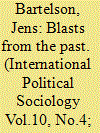

|
|
|
|
|
| Summary/Abstract |
This article is a brief inquiry into the changing meaning of war in Western political thought, with special reference to its role in fracturing the contemporary international system. I argue that contemporary debates about the changing nature of war have failed to note what I take to be the most important change in our understanding of war in recent decades—the return of the long-suppressed view that regards war as a productive force in human affairs. I substantiate this argument by showing how war was long believed to be productive of sociopolitical order in general, and of the modern state and the international system in particular. I then proceed to show how similar conceptions of war inform contemporary practices of military intervention and nation-building, and how the acceptance of this view among scholars has made them complicit in its legitimization and reproduction.
|
|
|
|
|
|
|
|
|
|
|
|
|
|
|
|
| 2 |
ID:
150568
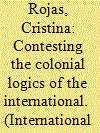

|
|
|
|
|
| Summary/Abstract |
In this article, I offer a critical historical analysis of modernity, identifying tensions between logics of modernity that rely on premises of colonial and capitalist modernity as a universalizing project, and those that instead propose an alternative decolonial project. As part of the latter, I outline the contours of an emergent and distinct political project premised on deep relational ontologies between humans, and humans and nature. I develop the analysis in three interrelated parts. I begin by critically reconstructing the justifications for the universal project of colonial and capitalist modernity and the “method of rule” through which it has been realized. In part two, drawing on case examples primarily from Latin America, I identify and discuss the opening toward an alternative political project of negotiating between worlds with the potential to challenge fundamentally the logics of universal modernity. In part three, I conclude with some critical insights into the colonial logics of modernity, emphasizing that they have always been contested. I argue that, given the inequalities and crises of modernity, there is an urgent need to reflect critically on the concrete possibilities afforded through an alternative political project, at the core of which are struggles for social justice without nature–culture distinctions. Ultimately, this project fractures the international and, instead, aspires toward the pluriverse.
|
|
|
|
|
|
|
|
|
|
|
|
|
|
|
|
| 3 |
ID:
150565


|
|
|
|
|
| Summary/Abstract |
Marriage is rarely accorded analytical attention by International Relations (IR) scholars. By contrast, feminist interrogators of marriage—as an institution and the site of lived experience—have exposed the reliance of militarists and militaries, and thus the conduct of international politics, on sustaining patriarchal marriage. By international political sociology taking those feminist interrogations seriously, we will be able to comprehend the significance of typically trivialized signals and gestures that otherwise fall through the nets of conventional international political analysis. “Military wives” (in all their national, racialized, and status diversity) prove worthy of serious international sociological attention. No military base, local or overseas, can be adequately understood without such attention. Attentiveness to gendered quotidian militarizing dynamics, in turn, will transform the IR narrative.
|
|
|
|
|
|
|
|
|
|
|
|
|
|
|
|
| 4 |
ID:
150566


|
|
|
|
|
| Summary/Abstract |
IED attacks in Afghanistan went from 797 attacks in 2006 to 15,222 attacks in 2012. In that time, 53,997 IEDs and their human collaborators injured more than 11,416 US soldiers and killed over 1,298 soldiers in Afghanistan. If you include Iraq, IEDs account for almost two-thirds of all US soldiers wounded and killed in both wars. This article investigates why something as low-tech as an improvised bomb is so significant to contemporary warfare. The article contends that, contrary to the effort to “beat” the IED by the US Department of Defense, the IED is not a thing. The IED, I argue, is a condition of possibility present in almost all of contemporary life. IEDs are native inhabitants of a world of global relations and things that hover on the edge between tool and weapon.
|
|
|
|
|
|
|
|
|
|
|
|
|
|
|
|
| 5 |
ID:
150569


|
|
|
|
|
| Summary/Abstract |
This paper interrogates the emerging practices of narrative methods in research that focuses on mobility and migration. It seeks to understand how these methods enable a conceptualization of global politics that challenges the global/local divide, revealing instead complex entanglements through which the local and the global are mutually constituted. Focusing in particular on the primacy of narrative, and on the concept of “translation,” the paper argues that participants in research author narratives in ways that reveal alternative, powerful accounts of global politics that are meaning-making and demand an understanding of “local” knowledges as valid and important insights into how global politics is understood. Ultimately, these methods engage the heterogeneous, multiple, and ultimately fully relational narratives of individuals who are autonomous and creative, and the ways these accounts interrupt the dominant narratives of how the world is politically understood—and is politically practiced.
|
|
|
|
|
|
|
|
|
|
|
|
|
|
|
|
| 6 |
ID:
150570
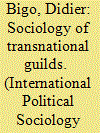

|
|
|
|
|
| Summary/Abstract |
This article seeks to discuss the emergence of transnational groups coming from the core of state bureaucracies and what has sometimes been called the “deep” or “right hand” of the state. In doing so, the article aims to explore the groups’ degree of autonomy in terms of elaboration of politics and their place within the different fields of power that irrigate the international. Are these groups exchanging information transnationally or not? Do they form a group, an elite of professionals, a guild, which has its own agenda and priorities? Have they a sense of solidarity provided by the sharing of a certain kind of know-how that enters into tension with the loyalty to a national agenda? And, if this exchange of information exists, as evidenced by the Snowden leaks, does it concur or not with the establishment of specific national security priorities?
|
|
|
|
|
|
|
|
|
|
|
|
|
|
|
|
| 7 |
ID:
150564
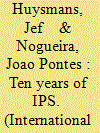

|
|
|
|
|
| Summary/Abstract |
In the past few years the relative success of international political sociology as an intellectual project has stimulated debates about its contribution to international studies. With this issue we celebrate ten years of International Political Sociology.
|
|
|
|
|
|
|
|
|
|
|
|
|
|
|
|
| 8 |
ID:
150571
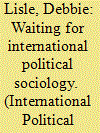

|
|
|
|
|
| Summary/Abstract |
This paper uses the work of Samuel Beckett to reflect on the in-between positionality of International Political Sociology (IPS) and offers a field guide to help scholars, students, and thinkers embrace this disposition more energetically. It makes the case for a more balanced transdisciplinarity that keeps the field of inquiry open while attending to the international, the political, and the social at the same time and in equal measure. The power of this in-between approach is that it forces thinkers in IPS to constantly look at the horrors of our contemporary world without turning away. Through the ambivalent position of the “happy wreck,” this paper explores the need to do something about these horrors (e.g., diagnose, act, intervene) while fully acknowledging that such actions always produce new forms of violence and exclusion. To help thinkers in IPS inhabit this challenging space of inquiry more confidently, the paper makes four suggestions: (i) broadening our emotional responses to the horrors of the world; (ii) resisting resolution through non-cathartic dispositions; (iii) pursuing slow research to contest dominant rhetorics of crisis and emergency; and (iv) re-imagining shared conditions of vulnerability.
|
|
|
|
|
|
|
|
|
|
|
|
|
|
|
|
|
|
|
|
|